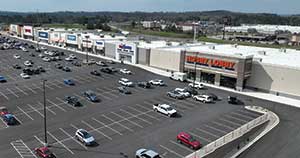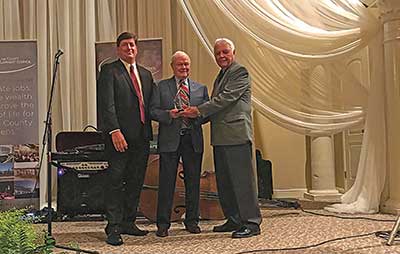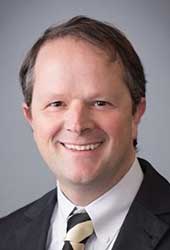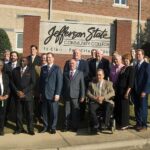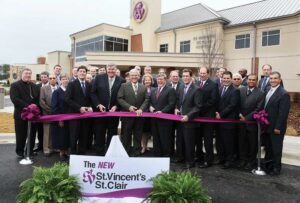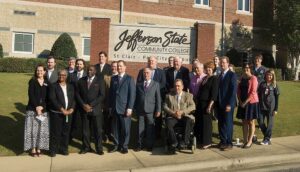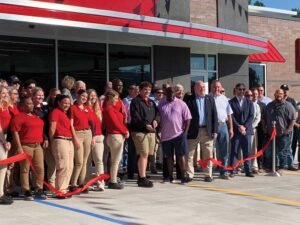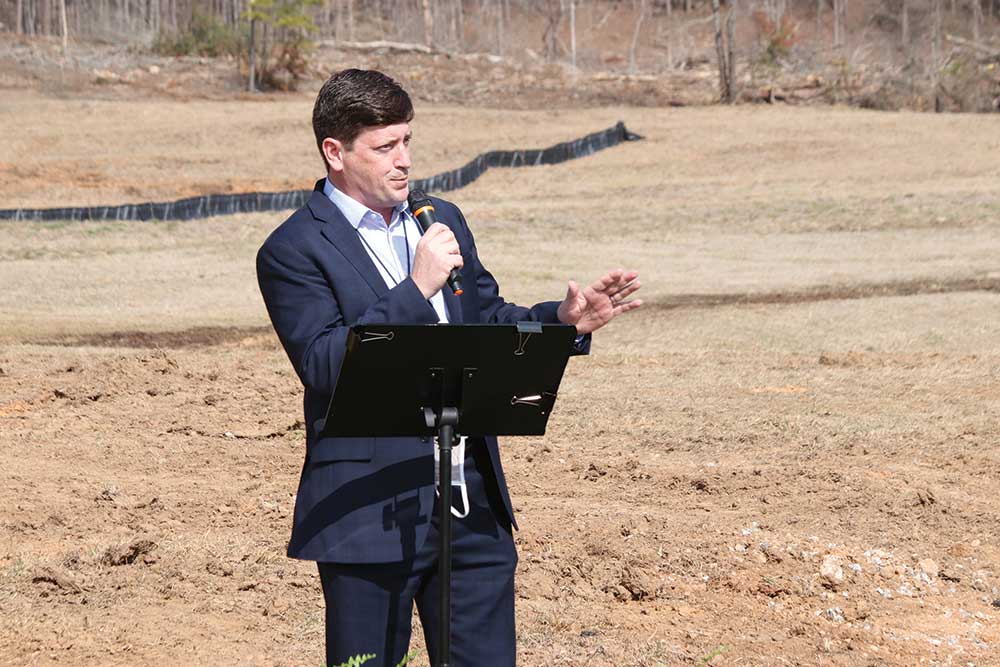
Story by Carol Pappas
Discover Photo Archives
It’s a small circle, to be sure, but the quality of work found within the arc is a legacy that will impact St. Clair County for generations.
In the 25-year history of the St. Clair Economic Development Council, only three directors have served. Ed Gardner Sr. laid the foundation. Ed Gardner Jr. followed in his father’s footsteps, building upon it, but put his own signature on it, too. And Don Smith continues the legacy with a lofty track record of successes others in economic development envy.
Building the foundation
As Ed Gardner Sr. departed the Gov. Fob James cabinet as director of the Alabama Department of Economic and Community Affairs at the end of his term, he had three choices for his next career move.
“I weighed all three,” Gardner said. Adding a chuckle, he said, “And I took the one that paid the least.” There was something about this newly hatched St. Clair Economic Development Council he found intriguing, challenging and potentially rewarding.
“I liked the board from the first day I met them,” he recalled, adding that Board Member Lyman Lovejoy’s “personality” hinted to him that “this is going to be a fun job.”
At the time, 90 to 95 percent of the projects were coming through agencies that were well funded, affording luxuries like international travel as simply a matter of course. The old adage, ‘it’s not what you know, it’s who you know,’ certainly applied to those like St. Clair who couldn’t afford the luxuries. And that’s where Gardner was at his best.
Even during the interview, the board knew they had the right man. Apologizing, Gardner asked if he could interrupt to take a call he had been expecting and really needed to take. They said yes, and he answered the call.
“It was a senator from Washington,” said Tommy Bowers, who served as chairman at the time. “If we could get him,” Lovejoy said, “it would be a homerun.”
“Ed was clearly our choice,” added Bowers, “and we offered him the job. That started the EDC as we know it today.”
His relationship with the Metropolitan Development Board was “really key in the early success,” Gardner said. “We got to look at every project that went through there.”
He had grant connections through ADECA, but by law, he couldn’t lobby for a year. So, he had an idea – bring all the sources together and introduce them to St. Clair County. He found the largest houseboat he could, the finest chef to cater and the best beverages to serve plus live entertainment, and he brought them all together for an unforgettable cruise on Logan Martin Lake.
Recognizing the importance of such a gathering, representatives of the four banks – the late Ray Cox and Metro Bank, Colonial Bank, NBC Bank and Union State Bank – anted up for the cost.
In St. Clair, he brought together mayors, commissioners, bankers and developers like Jason Goodgame and Bill Ellison. St. Clair’s Alabama Legislative delegation and its Congressional delegation were on board. So were government officials like then State Treasurer Kay Ivey.
“It meant they would spend a day or longer in Pell City,” he said. “It proved to be very, very successful.”
He didn’t stop there, knowing the relationships forged had to be maintained and strengthened. At the annual convention in Fairhope, EDC hosted dinner at the finest restaurant for all the partners to get to know St. Clair County better.
Gardner’s philosophy of building relationships worked, and successes followed. The Saks Fifth Avenue distribution center landed in Steele. He was on the team along with Bowers and Commission Chairman Stan Batemon that recruited Honda.
While Honda didn’t locate in St. Clair, it put roots down just across the border in Lincoln. Today, Honda is the largest employer of St. Clair County people not located in the county – 1,500- 2,000.
When Yachiyo, an automotive supplier, was considering St. Clair as a site, Gardner learned of an unpublicized radius around Honda in which suppliers were excluded from locating. A circle on a map excluded St. Clair completely. Company officials denied the existence of the circle but when Gardner offered to show them the map, Yachiyo was approved in Steele soon after.
Site selection isn’t the only consideration in a project. Sometimes it’s the amenities nearby. Eissmann, a German manufacturer of leather components for automobiles, was looking for a North American site. The decision makers on site selection were world-class water-skiing competitors.
So, Gardner solicited the help of St. Clair’s own skiing champion, Brad Brascho, who won the national title in slalom skiing. “I got Brad Brascho to take them out on the lake.”
They put together a one-and-a-half-hour presentation in two weeks and faxed every photo of a ski boat, Logan Martin and St. Clair County that could sell it, and “I got a call the next day they were coming to Pell City.” Today, after multiple expansions, Eissmann is the county’s largest employer.
The project he’s proudest of is not an industry at all, but rather a public safety one. At the time, I-20 had been experiencing a fatality nearly every month. Five-laning the heavily traveled stretch of highway had been on the drawing board for years but was no closer to fruition.
Then Mayor Guin Robinson lobbied heavily for a concrete barrier in the middle in a very public campaign, and he, Gardner, Batemon and Bowers met with state transportation officials and convinced them to make it happen.
St. Clair got the concrete barrier, and fatalities fell to historic lows. Later, a six-lane highway moved from drawing board to construction.
Other highway improvements led to more economic development. Officials knew the bridge over I-20 connecting U.S. 231 South with Home Depot, Walmart and other massive commercial development wouldn’t stand the test of time nor the traffic.
Transportation officials were able to recapture $2 million from other projects to apply to improving the bridge, but they needed a match. “Stan said, ‘I’ve got mine,’ and Guin said, ‘I’ve got mine.’ ” With the commitments, the bridge that now connects two major commercial districts secured its improvements.
The decision to locate a campus of Jefferson State Community College in Pell City came in 2004.
“We needed a community college presence,” recalled Robinson. Gadsden State Community College had been offering classes, but Jefferson State decided to build a campus in the county. Education, economic development and workforce development all go hand in hand, he said. “The pieces all aligned with Jeff State, the city and the county. It really made for a remarkable time to be involved.”
Robinson had just resurrected the St. Clair County Mayors Association. “It was a great forum for keeping everyone informed,” Gardner said, and it was utilized to keep all entities on the same page. It still is.
Gardner underscores that act of working together as the single-most crucial factor in how this success story unfolded. “We put together a team and partnerships, and it worked out pretty well.”
Following success with success
In March, fresh from a $10 billion deal bringing Amazon Web Services Inc. to Mississippi, Entergy Mississippi Vice President of Economic Development Ed Gardner Jr. reflected on another successful stint in his career.
From 2004 to 2010, he served as executive director of St. Clair’s EDC. “I was super young, and I really didn’t know a lot,” he said. In actuality, he came from eight years with economic development efforts for the City of Auburn, known widely for its standard-setting track record, where he served as deputy director.
“It was special succeeding my dad,” he said. “I really learned a ton working with the board.” While he learned from his father’s strengths and the foundation he laid, he led the organization to even greater heights.
“I realized I needed a team to do what I wanted to do. I needed to raise money to hire one or two people,” he said, noting that at the time, revenues were $200,000 vs. spending of $220,000 per year.
Gardner’s capital campaign raised $2.5 million over five years, giving him an opportunity to hire Don Smith as assistant director and Candice Hill as retail specialist, a first in the state. Together, they could – and would – put together projects that propelled the county forward.
The first were VST Keller now Oerlikon and WKW, German automotive suppliers that became leading industries in Pell City.
Before he left, the county broke ground on a new, state-of-the-art hospital and a state veterans home that is a model for the nation.
On the Col. Robert L. Howard State Veterans Home project, Gardner said Batemon sent him an article about the Veterans Administration zeroing in on a site in Jefferson County. Gardner contacted them, and Smith prepared a presentation. Admiral Clyde Marsh, head of Alabama Veterans Affairs, looked at the map and said, “ ‘That could work.’ We made a pitch. All three of us had something to do with it.”
The ironic part of the story was the argument of the pitch. “We used the new hospital, which was not certain, to lure the veterans home, and the veterans home solidified the deal with the hospital,” which also was not certain, Gardner said.
He still thinks it is “cool” when traveling on I-20 to look over at the hospital and veterans home perched prominently on the hillside and knowing he had a role in it.
As for first hiring who would eventually become his successor, Smith, Gardner said the choice was easy. He recognized his abilities early on back in their days in Auburn. Smith was an accountant for the revenue department for the city, and economic development needed someone to oversee the financials.
Gardner said he told his boss “that Don guy comes in early and stays late,” and he might have the kind of work ethic and ability they needed. They hired him as staff accountant in economic development. He eventually worked in lease management, deal structuring and financial management.
Gardner, too, talked about the business model of EDC as the reason for its success. “They got the model right. The key was they didn’t have elected officials on the board. It took politics out. The people who served have been great,” he said citing the way the makeup of the board brought everyone together toward a common good.
“There was cooperation in the county that other parts of the state asked, ‘How do you do that?,’ ” he said. “Getting along is important to business and to prospects.”
Taking the torch
Like a baton passed from one runner to the other in this economic development relay race, the executive directors who have served seem to handle it with ease and even greater speed than the one before.
When Smith entered the race, his challenge was to meet different needs of different communities – “trying to bring value to all of our communities.”
Through planning, innovation and that work ethic Gardner identified, Smith’s tenure has overseen explosive growth. Twenty five years ago when EDC began, the county’s population stood at 65,000. In 2030, it is predicted to top 100,000.
Smith oversaw the hospital opening in 2010 and the veterans home in 2011. “It’s been a whirlwind ever since then,” he said.
With a grateful nod to the foundation built by his predecessors, Smith said, “Ed Jr. and Ed Sr. have always been incredible, accessible and charitable with their time and wisdom.” The board “gives us a solid foundation to allow us to reach full potential. They have been an incredible guiding hand and extremely supportive without micromanaging.”
Under his leadership, groundbreakings and ribbon cuttings for new industry, expansions, retail, commercial and professional operations are so frequent they have become almost commonplace. Industrial growth has soared so much that the challenge has become industrial sites to locate them.
“That’s why the two SEEDS grants through the State, for a combined $2.5 million for infrastructure to aid in the development of the Kelly Creek Commerce Park in Moody and the purchase of property in Springville are so important,” Smith said. The two SEEDS, Site Evaluation and Economic Development Strategy, grants were the most in the state — $400,000 for sewer in Moody’s park and $2.1 million to acquire 240 acres in Springville.
“Our communities need large tracts of land with infrastructure to attract new industry and quality employers,” Smith said. “Large residential developments are looking for that land as well, so we have to be proactive.”
Retail growth has been spurred by job creation and residential growth from EDC efforts as well with EDC working closely in helping bring about major developments, like Pell City Square, which is anchored by Hobby Lobby, Ross Dress for Less, TJ Maxx, Old Navy and other big-name retailers.
More developments – restaurants and hotels – have moved from drawing board to construction.
Developer Bill Ellison calls it teamwork. Ellison has helped bring the likes of Pell City Square, Walmart, Buffalo Wild Wings, Premier Cinema, Publix and a seemingly endless list of tax revenue generators. His developments account for seven of the top 10 revenue producers that make up City of Pell City’s budget.
“The main thing was the coming together,” Ellison said. “They brought all the cities together under EDC, and that set up teamwork. Other EDCs in the state want to emulate how we do business.”
Ellison talked of his largest, early project – the Walmart development in Pell City, which led to massive commercial growth with retail, restaurants, hotels and other businesses.
Ed Garner Sr., he said, was able to help him navigate all the government approvals required of such a project en route to becoming reality, Ellison said. “That one project showed how EDC was going to function. It set a precedent on how we move forward. It showed us a path.”
Today, Smith is the guide along that path. “Don is such a huge asset to the county,” Ellison said. “He is a problem solver. He looks at every single development to determine if it is in the best interest of the city or county. Is it a fit? Is it good for the community? All projects have a mountain to climb, but he’s a problem solver. Once he’s committed, he will find a way to make it work.”
Constant evolution
Smith knows that change is inevitable, and he embraces it. Innovations are a hallmark of his tenure, generating even greater successes.
“I’ve watched him grow in the job,” Ellison said of Smith. “I have a ton of respect for the work he does, and he’s earned it.”
Retail and quality of life opportunities are flourishing in Pell City’s commercial districts and in places like St. Clair Arena and Event Center, Canoe Creek Landing and Big Canoe Creek Nature Preserve. All had help from Smith and EDC.
Leadership St. Clair County, under EDC’s umbrella, helps identify potential leaders in the county and brings them together each year in a program that helps them learn more about the place of their home or business and encourages them to get involved. It makes for a better outlook for the future.
EDC’s tourism, headed by Blair Goodgame, is focusing on supporting and growing events and promoting attractions, and they point to growth in the lodging taxes as evidence that it’s working. It plans to produce a new video to showcase the county and is creating community guides for all municipalities as well as one for the county and a host of other promotions of all aspects of the county.
Workforce development also continues to be a focus of EDC, developing partnerships with education and employers to provide skillsets where the jobs are or will be. Jason Roberts leads this initiative by bringing educators and employers together.
Perhaps the most groundbreaking initiative of EDC is its latest one – St. Clair County Grant Resource Center. Coordinated by Candice Hill, the center “potentially will have the largest impact of anything EDC has done,” Smith said.
A grant firm is being hired with expertise in securing grants across a wide spectrum. What that means for cities and towns across St. Clair County and the county itself is that they will be made aware of grants that can fit their needs – whatever they might be. The program will identify “what’s out there, how to obtain them and manage the grants correctly,” Smith said.
Where communities didn’t know about what was available or how to get grants before, they’ll know now, and the center will facilitate the entire process.
“Different communities have different needs,” Smith explained. “Some have more retail options than others,” some need basic infrastructure. That’s the challenge, the diversity of the needs, and managing to serve all of them. That’s the way the center will work, just like EDC has for 25 years.
See a need and fill it – together.














